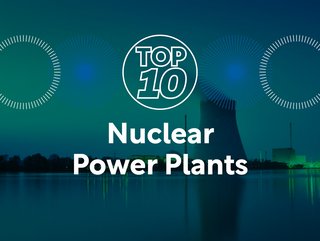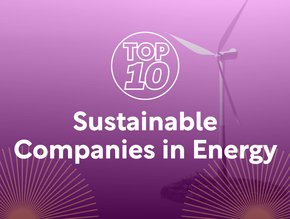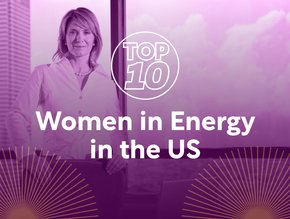
As renewable energy sources continue to see global growth in response to the climate crisis, nuclear power continues to be a relevant source of energy. Although not renewable, nuclear energy is still recyclable and produces zero greenhouse gases, serving as the second-largest source of low-carbon energy in the world behind hydropower.
Despite being operational for decades, technology around nuclear power is still developing, with works on clean nuclear power being explored, and further investment in the fuel source from governments around the world.
This list is ranked by total net capacity of reactors, using information from the International Atomic Energy Agency (IAEA). In 2022, as reported by the IAES, over 393.8 GW(e) of operational nuclear power capacity was available through 438 reactors across 32 countries. Overall, nuclear power capacity growth has been steady over the past decade, with a 20.3 GW(e) increase between 2012 and 2022.
10. Kori Nuclear Power Plant, South Korea, 4,655MW
The Kori nuclear power plant is made up of five reactors - Kori 2, 3 and 4, and Shin Kori 1 and 2 (shin translating to ‘new’ from Korean) which total a net capacity of 4,655MW. Kori 1 is permanently shut down.
Located near Ulsan, South Korea, the plant is owned and operated by Korea Hydro & Nuclear Power (KHNP).
= 8. Cattenom Nuclear Power Plant, France, 5,320MW
One of the joint eighth largest nuclear power plants in the world is Cattenom Nuclear Power Plant. The plant is made up of four PWRs rated at 1,300MW each, totalling a net capacity of 5,320MW.
Located in Cattenom, France, the plant is owned and operated by French electric utility company Electricite de France and uses cooling water from the Moselle River.
= 8. Paluel Nuclear Power Plant, France, 5,320MW
The other eighth largest nuclear power plant in the world is Paluel Nuclear Power Plant, also located in France, which consists of four PWRs with a net design capacity of 5,320MW (1,330MW each).
Also owned and operated by EDF, the plant is located 40km away from Dieppe, and spread across the waterfront of the English Channel which allows sustainable cooling from the Channel.
7. Gravelines Nuclear Power Plant, France, 5,460MW
Also located in France, the Gravelines Nuclear Power Plant consists of six 910 MW PWR units commissioned between 1980 and 1985 totalling an installed net capacity of 5,460MW.
The third plant in our list that is owned and operated by EDF, the nuclear power facility is the largest in France, located near Calais and uses cooling water from the North Sea.
6. Zaporizhzhia (Zaporozhye) Nuclear Power Plant, Ukraine, 5,700MW
With an installed net capacity of 5,700MW, the Zaporizhzhia Nuclear Power Plant has been the largest nuclear power station in Europe and the sixth largest in the world, however has recently experienced temporary shutdowns due to the ongoing conflict between Ukraine and Russia.
Located in Enerhodar, Ukraine, the plant is made up of six VVER-1000 PWR units brought online from 1984 through 1995.
Owned and operated by Energoatom, Ukraine’s state-run National Nuclear Energy Generating Company, the Zaporizhzhia Nuclear Power Plant was responsible for more than one-fifth of the country’s total electricity generation.
5. Hanbit Nuclear Power Plant, South Korea, 5,924MW
Formerly known as the Yeonggwang Nuclear Power Plant, South Korea’s Hanbit Nuclear Power Plant has an installed net capacity of 5,924MW.
The power plant, operated by Korea Hydro & Nuclear Power (KHNP), consists of six PWR reactor type units commissioned between 1986 and 2002.
4. Yangjiang Nuclear Power Plant, China, 6,000MW
The Yangjiang nuclear power plant is owned by China Guangdong Nuclear Power Company (CGNPC) and operated by the Yangjiang Nuclear Power Company.
Located in the Guangdong province, China, it has a net capacity of 6,000MW from six 1,000MW PWRs.
3. Bruce Nuclear Generating Station, Canada, 6,358MW
The third largest nuclear power plant is Bruce Nuclear Generating Station in Ontario, Canada.
Owned by Ontario Power Generation (OPG) and operated by Bruce Power, the Canadian plant has a net capacity of 6,358MW. It consists of eight pressurised heavy water reactors (PHWR) with net capacities varying from 769MW to 817MW, and the plant became fully commercially operational in May 1987.
2. Hanul Nuclear Power Plant, South Korea, 7,338MW
Ulchin Nuclear Power Plant — renamed Hanul Nuclear Power Plant in 2013 — is the largest South Korean nuclear power plant, and second largest globally.
The plant currently has a net capacity of 7,338MW, made up of six PWR Hanul reactors varying from 966MW to 999MW, and Shin Hanul-1 (PWR) which has a net capacity of 1414MW.
Shin Hanul-2, a PWR due to have a net capacity of 1340MW is under construction.
1. Kashiwazaki-Kariwa Nuclear Power Plant, Japan, 7,965MW
Opened in 1985 and owned by Tokyo Electric Power Co.’s (TEPCO), the Kashiwazaki-Kariwa plant in Japan has a net capacity of 7,965MW, making it the largest nuclear power plant in the world.
It totals seven boiling water reactors (BWR) — the first five with 1,067MW net capacity each and the other two 1,315MW. Kashiwazaki-Kariwa Nuclear Power Plant is currently suspended.
*******************
For more energy insights check out the latest edition of Energy Digital Magazine and be sure to follow us on LinkedIn & Twitter.
You may also be interested in Sustainability Magazine and EV Magazine.
*********************
BizClik is a global provider of B2B digital media platforms that cover Executive Communities for CEOs, CFOs, CMOs, Sustainability Leaders, Procurement & Supply Chain Leaders, Technology & AI Leaders, Cyber Leaders, FinTech & InsurTech Leaders as well as covering industries such as Manufacturing, Mining, Energy, EV, Construction, Healthcare + Food & Drink.
BizClik – based in London, Dubai, and New York – offers services such as Content Creation, Advertising & Sponsorship Solutions, Webinars & Events.






